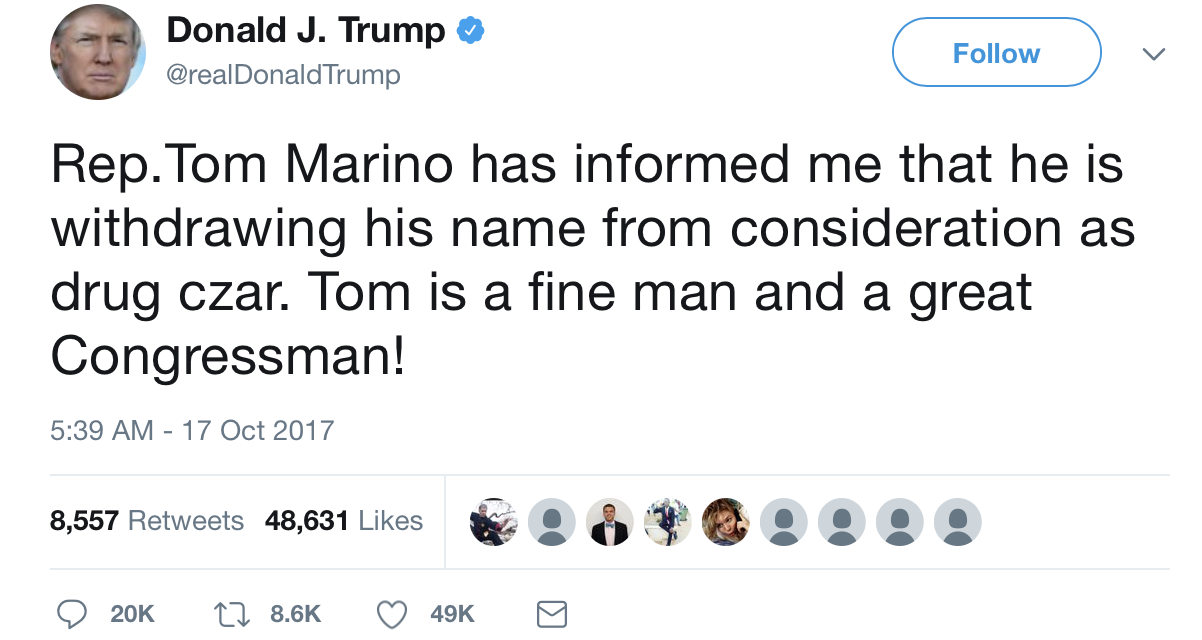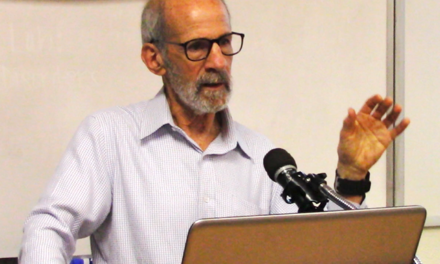From Steve Robinson, MD (forwarding an October 15 Washington Post exposé):
Amid a targeted lobbying effort, Congress last year weakened the DEA’s ability to go after drug distributors, even as the opioid epidemic raged and thousands of Americans were dying of overdoses, an investigation by The Washington Post and “60 Minutes” found. The “60 Minutes” report will air tonight at 7:30 Eastern and 7 Pacific.
The accompanying video is heartbreaking and angering! And many of these corporate shills are the same who oppose the research on and legalization of cannabis!
Retro Message: I know you’re not surprised that Big PhRMA is pushing synthetic opiates while pushing against cannabis. The corruption is so blatant! Tom Marino, the Republican Congressman from Pennsylvania pushed the bill limiting the DEA’s ability to go after drug distributors and gets $100,000 from Big PhRMA. Marino had been Trump’s nominee to be the Drug Czar (head of the Office of National Drug Control Policy). On Tuesday 10/17 President Trump tweeted “Rep.Tom Marino has informed me that he is withdrawing his name from consideration as drug czar.”
Let us note that not one member of either party voted against this bill when Marino slid it through.
Also From Steve Robinson, MD: Why fentanyl is deadlier than heroin, in a single photo:
On the left, a lethal dose of heroin; on the right, a lethal dose of fentanyl. Source: New Hampshire State Police Forensic Lab
My memory is less perfect than ever, and I can’t find documentation online, but I had it from a reliable source that former Supreme Court Justice William Rehnquist —a fierce Drug Warrior— used Fentanyl every day for back pain, for years, but didn’t consider himself an addict because he checked into the Betty Ford Center for an annual detox. —FG
This just in from Connie McLaughlin-Miley, the scoop on Rehnquist from Prison Legal News… I was wrong about the Chief Justice’s downer of choice and rehab regimen, but right about him getting loaded… And right about his political track record before ascending to SCOTUS.
FBI Files on Chief Justice Rehnquist Reveal History of Sedative Addiction
Files released by the FBI in 2007 show that the late Supreme Court Chief Justice William Rehnquist was so addicted to a powerful sedative that his dosage levels caused him to become delusional and to attempt to escape a hospital when doctors tried to take him off the medication.
The files were released by the FBI to the Associated Press pursuant to a Freedom of Information Act request following Rehnquist’s September 2005 death.
The files show that two presidents enlisted the FBI to find out what witnesses would say during confirmation battles for Rehnquist. The Nixon administration was deeply concerned about hostile witnesses at the 1971 hearing to confirm Rehnquist as a Justice, for the Senate had already rejected two previous nominees, Clement Haynsworth and G. Harrold Carswell. Likewise, President Reagan asked for the FBI’s help when he nominated Rehnquist to be Chief Justice in 1986.
It was previously known that in late December 1981 Rehnquist had checked into the George Washington University Hospital for a week to be treated for back pain and dependence on a prescription drug. That fall, journalists had noted that Rehnquist’s speech on the bench was sometimes slurred.
The FBI files disclosed new facts about the addiction. The FBI concluded during its 1986 investigation that after back surgery in 1971 Rehnquist began taking Placidyl for insomnia. Placidyl is not an opiate or painkiller; it is a sedative and sleep-inducing drug that is usually not prescribed for more than a week.
By 1981, Rehnquist was taking 1,500 milligrams a day of Placidyl, which is three times the starting dose. When he stopped taking the drug, a doctor said Rehnquist thought he was hearing voices plotting against him outside his hospital room. He also had “bizarre ideas and outrageous thoughts,” including imagining “a CIA plot against him.”
These thoughts led Rehnquist to go “to the lobby in his pajamas in order to try to escape.” Doctors began to give him the drug again, and they slowly weaned him off it. He quit taking it entirely on February 7, 1982.
The files also show that Republican Sen. Strom Thurmond, the Chairman of the Senate Judiciary Committee, requested the FBI to question witnesses who might testify about allegations that Rehnquist had “challenged” African-Americans waiting in line to vote in Phoenix in 1962. At the time, Rehnquist was an advisor to the local Republican Party.






